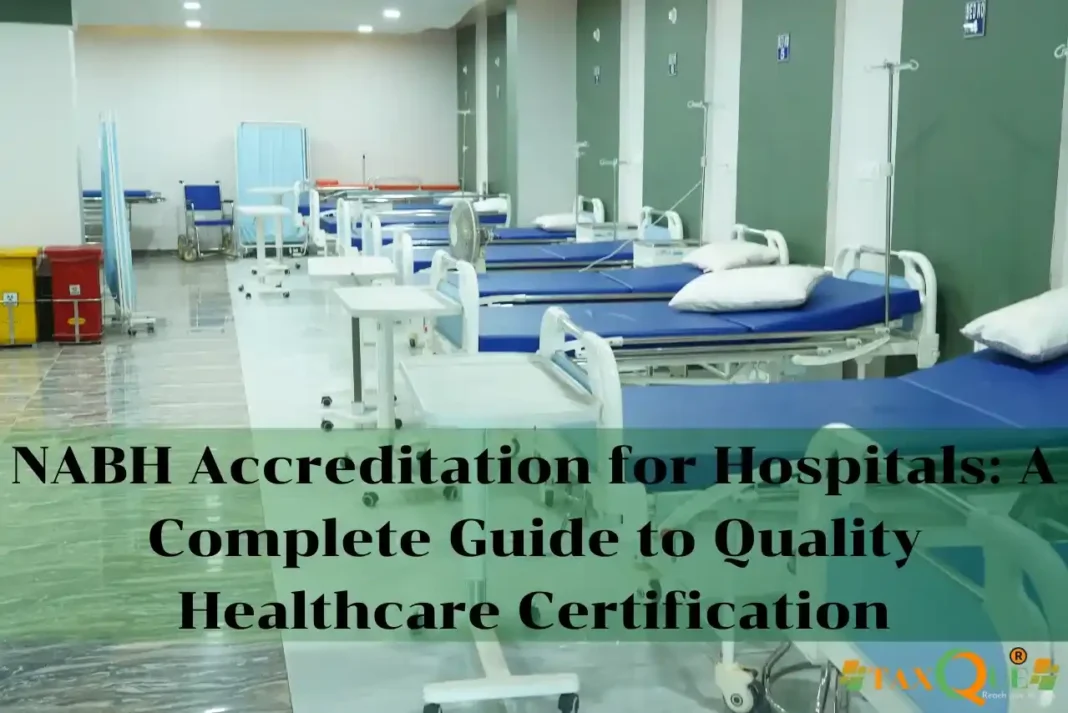Introduction
NABH Accreditation is a prestigious certification that sets the standard for quality healthcare in India, ensuring hospitals prioritize patient safety and care. Managed by the National Accreditation Board for Hospitals & Healthcare Providers (NABH), a part of the Quality Council of India (QCI), it aligns with global benchmarks. For hospitals and clinics, this certification boosts credibility and access to government schemes. This blog guides you through the NABH Accreditation process, its benefits, and key requirements to achieve excellence.
What is NABH Accreditation?
The NABH Accreditation program, run by the Quality Council of India, certifies healthcare facilities for high standards in patient care and operations. It meets international benchmarks set by the International Society for Quality in Health Care (ISQua). NABH evaluates hospitals on safety, clinical care, and efficiency. For more details, visit the official NABH website.
Who Can Apply for NABH Accreditation?
This certification is open to various healthcare facilities, including:
- Multi-specialty and single-specialty hospitals
- Nursing homes and AYUSH hospitals (Ayurveda, Yoga, Unani, Siddha, Homeopathy)
- Blood banks and diagnostic centers
- Eye care centers, dental clinics, and wellness clinics
- Primary health centers
Any facility committed to quality care can apply, regardless of its size.
Key Standards and Criteria
The NABH Accreditation process involves 102 standards and 636 objective elements, covering:
| Category | Key Focus Areas |
|---|---|
| Patient-Centric | Patient rights, education, and clinical care |
| Safety | Infection control and facility safety |
| Operations | Medication management and infrastructure |
| Management | Human resources and information systems |
These standards ensure a comprehensive approach to quality healthcare. For details, refer to NABH’s standards page.
Step-by-Step Process for Certification
Here’s how to achieve NABH Accreditation:
- Self-Assessment: Conduct an internal review using NABH’s checklist to identify gaps.
- Application Submission: Apply online via the NABH portal, submitting documents and fees.
- Pre-Assessment Audit: NABH assessors evaluate readiness and suggest improvements.
- Final Assessment: A detailed audit verifies compliance with standards.
- Accreditation Decision: NABH grants certification (valid for 3 years) based on the audit.
- Surveillance and Renewal: Periodic reviews ensure ongoing compliance.
The process typically takes 6–12 months, depending on preparation.
Documents Required
To apply for NABH Accreditation, prepare:
- Hospital registration certificate
- List of services, departments, and staff qualifications
- Standard Operating Procedures (SOPs) and policy documents
- Infrastructure layout and safety compliance reports
- Training records and infection control protocols
Ensure documents are current to avoid delays.
Benefits of NABH Accreditation
Achieving NABH Accreditation offers key advantages:
- Enhanced Trust: Builds patient confidence in quality care.
- Improved Outcomes: Standardizes clinical and operational processes.
- Government Empanelment: Eligibility for schemes like CGHS and Ayushman Bharat.
- Medical Tourism: Attracts international patients with recognized standards.
- Insurance Reimbursements: Easier tie-ups with insurance providers.
- Safety Culture: Promotes accountability and infection control.
For compliance support, platforms like TaxQue provide expert guidance. Visit TaxQue for help with certification processes.
FAQs About NABH Accreditation
- What is NABH Accreditation, and why is it important?
It certifies healthcare facilities for quality, safety, and patient-centric care, enhancing trust and eligibility for government schemes. - How long is the certification valid?
It is valid for 3 years, with periodic surveillance audits to maintain compliance. - Can small clinics apply for NABH Accreditation?
Yes, all healthcare facilities, including small clinics and AYUSH hospitals, can apply if they meet NABH standards. - What documents are needed for the process?
Key documents include hospital registration, SOPs, staff qualifications, and safety compliance reports. - How does certification benefit patients?
It ensures safe, standardized care, better clinical outcomes, and transparency in hospital operations.
Conclusion
NABH Accreditation is a commitment to excellence in healthcare, ensuring hospitals deliver safe and high-quality services. By meeting NABH’s rigorous standards, facilities gain patient trust, operational efficiency, and access to government and insurance benefits. The certification process, though detailed, is achievable with proper planning. Whether you run a large hospital or a small clinic, NABH Accreditation is the gold standard for quality care in India.





